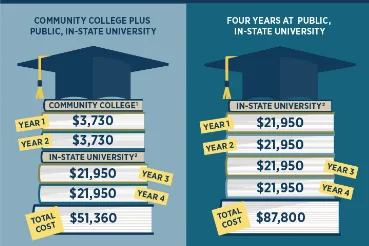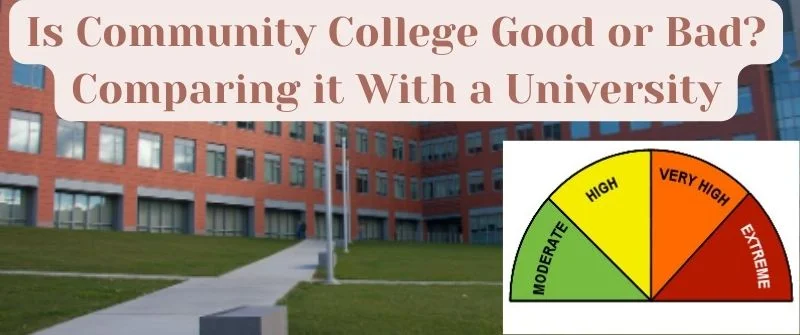Community colleges are at the heart of the American Dream. Today, it’s more desirable to attend a community college than University.
For many, community college provides enough opportunities to build a collegiate resume and start their professional life by working on campus as an intern or part-time employee.
Is it a wise decision to pursue a community college degree? Let’s start by looking at what it takes to go through a community college program.
Is Community College Good or Bad?

Community colleges are great for students who have been placed in remedial courses or have just dropped out of high school and need to get their GED or another certificate.
Also, Community colleges also provide a great education for those with less than stellar grades from high school who want a chance to earn an associate degree. Community college is also the perfect place for students who want flexible scheduling and greater access to financial aid.
These things make community college a better option than many other options. However, there are some drawbacks to community college as well.
The biggest drawback is its reputation as “lower quality” than other schools. This is mostly because community colleges often have lower tuition rates than four-year institutions and offer more flexible schedules and classes at your own pace.
These factors can make community college seem like it’s designed for those who aren’t quite ready for college yet, even though it still offers plenty of benefits for those who need them most!
What Makes a Community College Good and Worth it?
Community colleges are good and worth it because they offer a wide range of courses that cover all aspects of life. It is also where students can get the skills and knowledge needed to succeed in their future careers.

Community colleges allow students to take classes for free or low cost, which may be their only way to afford college. The classes are not always easy, but they are offered at a time that works best for the student.
Community colleges are a practical alternative to traditional four-year universities. They offer certificates, diplomas and associate degrees in various subjects, including business, healthcare and education.
Comparison between Community College and a University
Similarities
- The two institutions share many similarities. They are both universities, although the latter usually offer more specialized programs. Community colleges have a broad range of subjects and disciplines, while universities specialize in one or two fields. Both offer students the opportunity to earn a bachelor’s degree upon graduation.
- Both institutions provide students with access to financial aid resources like scholarships and grants when applying for admission, as well as financial assistance during their studies once enrolled at the college level.
Differences
- The main difference between community colleges and universities is that community college students enroll in programs that lead to transferable credits. In contrast, those at universities must complete the entire four-year program before they can transfer their credits.
- Community colleges and universities offer various academic programs, but they differ in how students can choose which programs to pursue.
At community colleges, students may be able to earn either an associate’s or bachelor’s degree depending on their education level and the type of program they have chosen. Students who want to transfer credits between institutions must do so through the proper channels.
- Universities also offer various types of academic programs, including bachelor’s degrees and master’s degrees in various fields of study.
However, unlike community colleges, universities allow students to choose their own major before attending classes so that they can focus on one subject area instead of being forced into a general education requirement at the start of their college careers.

Is Community College for Losers?
Community colleges are often viewed as the second-best option for students who didn’t get into the four-year colleges of their choice.
However, community college is not for losers — it’s for the rest of us! Every college is worth it. Here are some ways to use community college as an advantage:
- You could transfer credits to a four-year school and get a bachelor’s degree in less time than it would take if you were in a two-year or four-year program. Many online courses can also be completed from home, making it easier to study full-time.
- You will learn something new every day. Community colleges offer classes all over the country, at different times and days of the week — so you never have to settle for what’s available when you’re looking for something specific. And because they’re open to all comers, they’re more affordable than private schools.
- You will meet people who aren’t like yourself — maybe even someone who will end up being your best friend! Many community colleges have clubs, student organizations and sports teams designed specifically for first-generation students or other groups that aren’t well represented at other institutions.
Why are Community Colleges cheaper?
One of the biggest benefits of community colleges is their affordability. Community college tuition and fees are typically lower than four-year public universities, and many community colleges offer free tuition for students who qualify for financial aid.

Community colleges are more affordable because they don’t offer as many programs or degree options.
In contrast, most four-year public universities offer a wide range of degrees — including bachelor’s degrees in fields like business management and engineering — with varying costs based on program length, degree level and whether students are in need-based financial aid.
Community colleges also rely less on federal funding than four-year schools, which means they have fewer administrative costs and overhead expenses. This allows them to keep tuition relatively low while providing high-quality educational experiences for students at all income levels.
Community colleges are cheaper than four-year schools because they have fewer resources. They don’t have to provide students as many services and amenities as the more expensive colleges. Community colleges offer fewer services and amenities but still try to provide the same quality education as four-year schools do.
Community colleges also tend to be more convenient for many students. Many community colleges are located in urban areas, making it easier for students living there to attend. In addition, community colleges often offer courses at night or on weekends so that students can attend classes during the day if they want to work or attend school at night.
Are Courses at Community College Hard?
The long answer is that it depends on a lot of things. It depends on the type of college you’re going to, what kind of program you’re taking, and how many hours per week you’re doing it all.
Suppose you are attending a large, 4-year university with thousands of students all trying to get into their major. In that case, you’ll find classes very easy because so many people compete for limited resources like professors and office hours.
However, suppose you are attending a small two-year community college with only a few hundred students in your major department. In that case, it will likely be much more difficult to get into classes because so few people compete for limited resources like professors and office hours.
On the other hand, Yes. Community college courses are harder than at a four-year university. That’s because the student population is much more diverse and many students aren’t as well prepared for college as high school graduates.
Many community colleges offer courses in remedial areas like math and writing, which can be challenging for non-native English speakers.
In addition to these challenges, community colleges also face additional constraints: They must have sufficient funding to offer classes and support students who need extra help.

